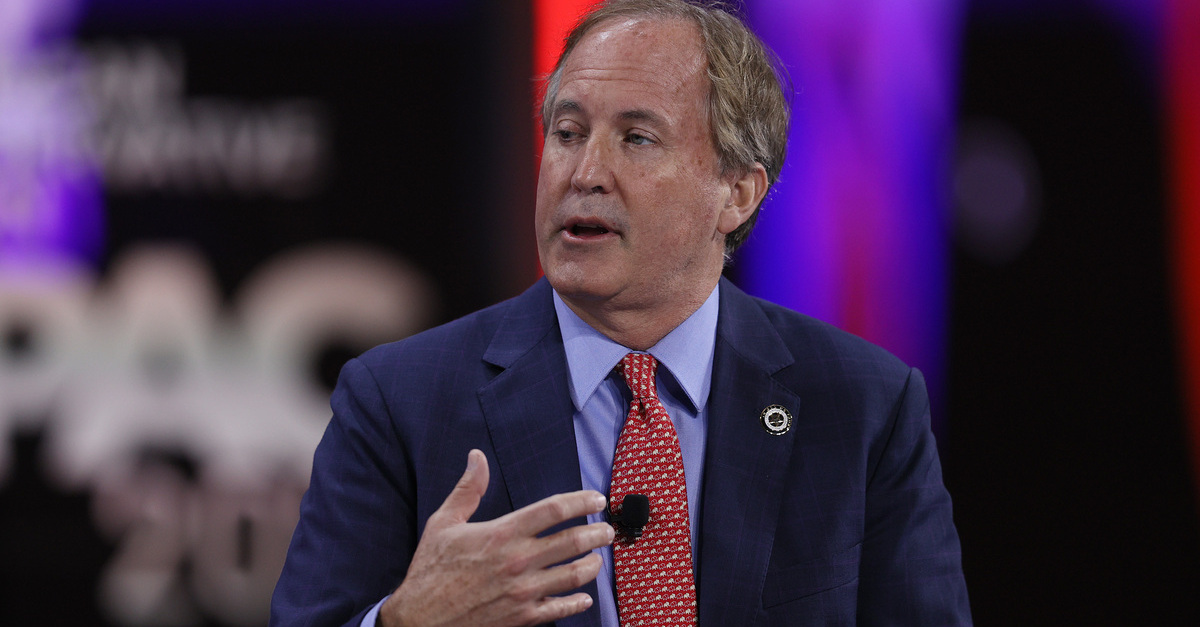
Texas Attorney General Ken Paxton speaks during a panel discussion during the Conservative Political Action Conference held in the Hyatt Regency on Feb. 27, 2021 in Orlando, Florida.
Texas Attorney General Ken Paxton (R) unblocked some of his Twitter critics after they sued him for violating the First Amendment.
“We’re pleased that Attorney General Paxton has agreed to unblock our plaintiffs in this lawsuit and are hopeful that he will do the same for anyone else he has blocked from his Twitter account simply because he doesn’t like what they have to say,” said Katie Fallow, a senior staff attorney at the Knight First Amendment Institute, the same Columbia University-based group that successfully sued former President Donald Trump for blocking his Twitter critics.
In April, nine people sued the Lone Star State’s top law enforcement official in federal court after he blocked them on Twitter. All Texas residents, the individuals suing include immigration advocate Mario Carrillo, University of Texas student Joseph Cascino, tech salesman Justin Champlin, and others.
Some of those plaintiffs earned the attorney general’s ire after tweeting about funding for lawsuits brought by his office, his still-pending indictment on securities fraud charges, and the taunt “wear a mask nerd” after Paxton retweeted a mask-less photo of himself at the Conservative Political Action Conference.
Their 34-page complaint alleges that Paxton’s blocking spree violated the First and 14th Amendments “because it imposes a viewpoint-based restriction” on their ability to participate in a public forum, their ability to access official statements made by the government, and their ability to petition the government for redress of grievances.
At the heart of the lawsuit is the argument that Twitter serves as a designated public forum, a term of art in U.S. constitutional law.
The U.S. Supreme Court’s public forum doctrine centers around the notion that certain places–either physical or digital–have, by tradition or practice, been used by the general public for speech-related purposes and should remain free of government interference. Under the high court’s jurisprudence there are three types of public forums: traditional, designated, and closed.
A number of litigants have argued that Twitter qualifies as a designated public forum in various lawsuits targeting politicians who have blocked them on the website–including former President Trump and Rep. Alexandria Ocasio-Cortez (D-N.Y.). And courts have generally been receptive to this legal argument.
“Multiple courts have recognized that government officials who use their social media accounts for official purposes violate the First Amendment if they block people from those accounts on the basis of viewpoint,” Fallow noted.
The Knight Institute notched victories endorsing the theory of Twitter as a designated public forum in both the Second and Fourth Circuit Courts of Appeal.
In Paxton’s case, very little activity has occurred on the docket. The attorney general has yet to respond to the allegations in a pleading or motion of any sort. His recent decision to unblock the nine plaintiffs could be viewed as an effort to have the lawsuit eventually tossed for mootness.
The original petition, however, speaks on behalf of “other individuals who were blocked from [Paxton’s] account based on their viewpoints” and asks for injunctive relief that would prohibit Paxton from blocking his critics.
“This is a step in the right direction. Attorney General Paxton cannot prevent Texans from exercising their First Amendment rights, including their right to criticize his policies and qualifications in their responses to his tweets,” Kate Huddleston, attorney for the ACLU of Texas said in a statement. “It remains to be seen, however, whether the Attorney General will unblock other Texans whose speech he’s suppressed. It shouldn’t take a lawsuit for Attorney General Paxton to comply with the Constitution.”
Paxton did not immediately respond to Law&Crime’s email requesting comment.
[image via Joe Raedle/Getty Images]